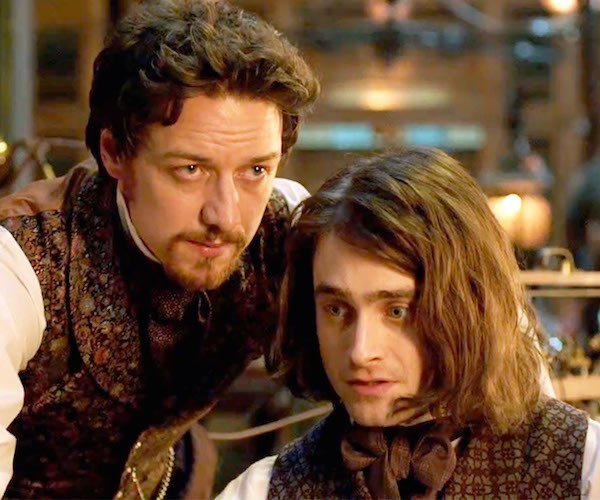Film Review: “Victor Frankenstein”— Fans of the Monster Will be Gravely Disappointed
Yet another cinematic variation on Mary Shelley’s novel—and this one too often opts for slick jolts of adrenaline over credibility.
Victor Frankenstein directed by Paul McGuigan. Screening at cinemas around New England.

James McAvoy and Daniel Radcliffe share a quiet moment in “Victor Frankenstein.”
By Betsy Sherman
Victor Frankenstein joins a long line of movies that veer from the source material, Mary Shelley’s Frankenstein or, The Modern Prometheus. This includes, of course, the 1931 James Whale classic Frankenstein. It makes the interesting stretch of re-imagining the familiar story of a scientist bent on animating dead flesh into a mismatched-buddy movie. Screenwriter Max Landis tells the story of Victor’s quest from the point of view of Igor, a hunchbacked circus boy who becomes Frankenstein’s partner in medical overreach. The movie’s stars, Daniel Radcliffe as the narrator and James McAvoy as the mad genius, bring emotion and fresh-faced babe-osity to the relationship story, but the script goes too far afield in too many directions and director Paul McGuigan (Push) too often opts for slick jolts of adrenaline over credibility. Victor Frankenstein will be a minor entry in the canon and will especially disappoint fans of the Monster (and really, who isn’t one).
The association of a hunchbacked Igor with the Frankenstein name isn’t from the book (Victor created his creature by himself) or the Whale movie (Dwight Frye played assistant Fritz, who wasn’t a hunchback). It was Bela Lugosi who played the first proper Igor—spelled Ygor—a bitter and vengeful broken-necked blacksmith in Son of Frankenstein (1939) and The Ghost of Frankenstein (1942). But over the decades, the name may be best known as part of Frankenstein satire; Igor gets a shout-out in the song “Monster Mash” and reached his apotheosis as Marty Feldman’s cheeky Eye-gor in Mel Brooks’s Young Frankenstein.
The story is set in 19th-century London. Radcliffe’s character relates his miserable beginnings as a nameless hunchback in a circus, abused in the ring and out, who also happens to be—ahem—the circus company’s doctor, seeing as how he’s a voracious reader of anatomy books. He’s smitten with trapeze artist Lorelei (Jessica Brown Findlay); he and the well-dressed medical student Victor meet cute when they reset the “fallen angel’s” broken collarbone (about the only fidelity to the novel is that Frankenstein was indeed in college when he created his homunculus). Victor rescues the prodigy from the circus-master who purports to own him. There’s a spirited scene of tumult by the big-top, after which Victor brings him home, names him Igor, and pops the abscess that everyone else has thought was a hump on Igor’s back.
Victor declares that he believes that death can be a temporary condition, and tells Igor how he intends to convert electrical energy into life using his invention, the Lazarus Fork. He uncovers a jar containing a pair of eyes that, when jolted, blink and constrict in the light. He’s overjoyed when his new friend reacts not with shock, but by offering a critique of his handiwork. Victor puts Igor’s hands and mind to work refining his experiments on animals (the reason he was trolling the circus grounds). The filmmakers humorously thwart expectations by having Victor’s presentation at the college be embarrassingly ill-attended. After a false start, the chimpanzee-like creature comes to life, giving the movie its second run-amok scene, where Igor chases the snarling beast through a school laboratory. Undaunted by his creation’s ferocity, Victor still harbors a dream to build a human being.
Radcliffe’s Igor has an Edward Scissorhands vibe of sweetness and naiveté. He gets a romantic arc as Igor fulfills his dream of winning Lorelei, who after her fall regains her health and gains a (conveniently gay) benefactor who lives in a big estate where a fancy-dress ball scene can be staged. McAvoy plays the sophisticated and accomplished Victor sporting a sinister Van Dyke beard and using his plummy Professor Xavier accent. He gives the young scientist an impish air and a swagger that quickly dissipates in the presence of his stern father, played by Charles Dance.
It’s when the movie widens from this core group of characters that it stumbles fatally. Early on, Inspector Turpin of Scotland Yard (Andrew Scott, who plays sub-villain C in Spectre) connects the brouhaha at the circus with a recent series of animal mutilations and voila, there suddenly, improbably, appear wanted posters with drawings of both the hunchback and Victor. The character, linked to the policeman played in Son of Frankenstein by Lionel Atwill (and parodied hilariously by Kenneth Mars in Young Frankenstein) is for the most part a crashing bore, though he does perform the necessary function of bellowing that Victor is doing “Satan’s work!”
The further embellishment is more damning. Victor performs his signature work, creating his “Prometheus,” with the backing of, and under the watchful eye of, aristocratic classmate Finnegan (Freddie Fox), a proto-Nazi Youth type who has vaguely fascistic plans for acquiring this new “technology.” It feels wrong that, at the moment we’ve been waiting for, there are a bunch of faceless henchmen around. As for Prometheus, he’s a function of stuntwork and special effects, not of acting. It made me long for the Chimpmonster.
Betsy Sherman has written about movies, old and new, for The Boston Globe, The Boston Phoenix, and The Improper Bostonian, among others. She holds a degree in archives management from Simmons Graduate School of Library and Information Science. When she grows up, she wants to be Barbara Stanwyck.
